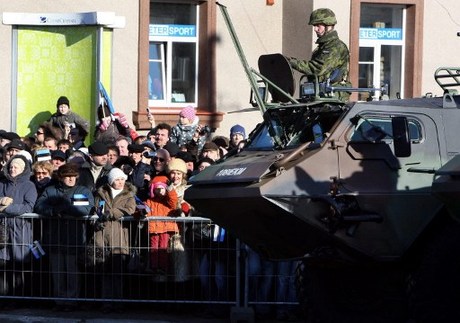U.S., Baltic States Sign Military Pacts as Trump Uncertainty Grows

The United States and Baltic NATO allies Estonia and Lithuania signed military deals on Tuesday as President-elect Donald Trump's pro-Moscow stance stokes uncertainty about future commitments.
Fellow Baltic state Latvia has also inked a similar agreement defining the status of hundreds of U.S. troops that are to be deployed this year to deter a more militarily aggressive Russia on NATO's vulnerable eastern flank.
These pacts also come after Washington launched a separate mission last week that will see an armored brigade of some 3,500 soldiers and heavy equipment sent to Poland, the Baltic states and nearby NATO allies Romania, Bulgaria and Hungary.
The U.S.-lead NATO has been increasing its military presence along Europe's borders with Russia ever since Moscow's 2014 annexation of Crimea from Ukraine.
The Kremlin denies it has any territorial ambitions and accuses NATO of trying to encircle Russia.
But Moscow's deployment of nuclear-capable Iskander missiles into its already heavily militarised Kaliningrad exclave last year and frequent military drills in the Baltic region have rattled nearby NATO states.
The defense accords, which controversially limit the jurisdiction of local courts over U.S. military personnel, still need to be ratified by the respective national parliaments.
"It's in our interest to have U.S. forces here, and we must have clarity over their status," Lithuanian Defense Minister Raimundas Karoblis told AFP as he concluded the so-called "status of forces" agreement with U.S. Ambassador Anne Hall in Vilnius.
Estonia's Defense Minister Margus Tsahkna echoed the remarks, saying the accord "supports the presence of U.S. units in Estonia and strengthens our security."
Karoblis added that Lithuania, the largest and southernmost of the three Baltic states, will host "up to 800 U.S. troops" at a time this year.
- Trip wire -
With a combined population of six million, the three formerly Soviet-ruled Baltic nations have warily watched Trump question the U.S. commitment to guarantee the security of NATO allies.
A day after Trump declared in an interview that NATO was "obsolete," Karoblis said Lithuania was "open to discuss" his suggestion to boost the alliance's role in fighting terror.
He insisted Trump's words had "no direct link with today's agreement."
"Trump's comments and his general unpredictability have raised fears that they might encourage Russian adventurism, but there is also confidence that Trump's advisers and Lithuania's friends in Congress will ensure that support for the Baltics will not be undermined," Vilnius University analyst Kestutis Girnius told AFP.
Last year, NATO decided to deploy four multinational battalions to Poland and the Baltic states to serve as a trip wire that would automatically involve NATO allies in the event of any attack by Russia.
Some 1,200 troops will join a German-led NATO battalion in Lithuania later this year.
Over 100 Dutch personnel and four F-16 fighter are currently deployed to a NATO air policing mission guarding Baltic skies.
Lithuania has announced plans to build a fence on the border with the heavily militarized Kaliningrad, in a bid to ward off potential hybrid warfare threats which could see unmarked military personnel cross into NATO territory.
Vilnius also increased its defense budget by a third this year and pledged to meet NATO's two-percent-of-GDP funding target in 2018.



